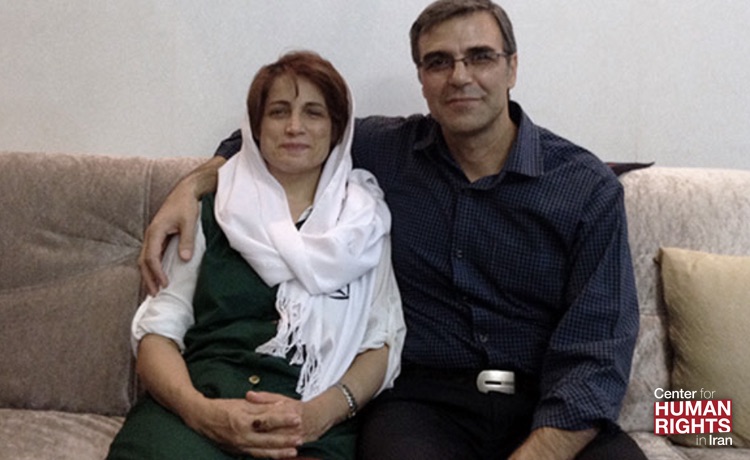
Doctors: Her Return to Prison Was “A deliberate attempt to put her life in danger”
Family’s Repeated Requests for Medical Furlough and Hospitalization Denied
October 13, 2020 — New information regarding the severe deterioration in the health of imprisoned human rights lawyer Nasrin Sotoudeh emerged today, as her husband, Reza Khandan, relayed her “grave cardiac and pulmonary problems” that were due to delays in medical treatment, and her exposure to COVID-19 during her recent brief hospitalization.
Sotoudeh had been on a hunger strike from August 11, 2020 to September 26 to protest the continued imprisonment of Iran’s political prisoners. She was hospitalized on September 19—only to be sent back to Evin prison on September 23, despite her deteriorating medical condition.
Khandan relayed that the prison doctors were “shocked” that she was returned to prison in her condition, and “strongly protested,” as during her hospitalization severe cardiac issues were identified.
Khandan also reported that during her hospitalization from September 19 to September 23, Sotoudeh was exposed to multiple guards who later tested positive for COVID-19. He stated that doctors outside the hospital who reviewed her tests consider her transfer back to prison as “a deliberate attempt to put her life in danger.”
“Nasrin Sotoudeh’s life is in danger because the authorities in Iran are withholding proper medical treatment, in complete violation of Iranian and international law; this is tantamount to attempted murder,” said Hadi Ghaemi, CHRI executive director.
CHRI calls for the immediate transfer of Nasrin Sotoudeh to hospital where she can receive full and proper medical treatment with the full consent of her family.
Following is the full transcript of Reza Khandan’s statement on October 13, 2020:
40 days after Nasrin’s hunger strike, following multiple warnings by prison doctors expressing concern over her condition, after considerable delay, she was finally transferred to the hospital. Her grave cardiac and pulmonary problems may well have been due to this delay in medical treatment and supervision.
20 days have now passed since she was transferred back to Evin prison from the hospital. As she has related, the prison doctors were shocked that she was returned to the prison with such haste and without proper medical treatment, especially considering her continued hunger strike. One of the prison doctors strongly protested against her being returned to prison in such conditions. Her heart monitor recorded significant changes that were proof of the grave cardiac deterioration. At the hospital, she was immediately transferred to the ICU, where following additional cardiac tests, the medical board had confirmed that she needs an angiography procedure.
Now, with the passage of 20 days, she was released back in the ward without any medical supervision. Her difficult, constricted breathing has increased our anxiety about her condition.
During her days in the hospital, it was evident that her white blood cell count was extremely low, thereby she had a weakened immune system. Later, it has become clear that at least six of the prison guards in charge of her at the hospital had contracted COVID. The female prison guards who were later identified as having COVID were seated on a chair next to her bed day and night.
Given her grave physical and cardiac ailments, the doctors outside the hospital who were able to review information about her documents and tests consider her transfer back to prison as a deliberate attempt to put her life in danger. Despite her and the family’s requests for a medical leave or transfer to the hospital, the prosecutor has not provided. The judicial system of the Islamic Republic is directly responsible for the health of prisoners in its custody and thus directly responsible for the consequences of any unfortunate incident arising from her transfer to prison and from her exposure to dangerous conditions and lack of medical treatment while in custody.
Reza Khandan
